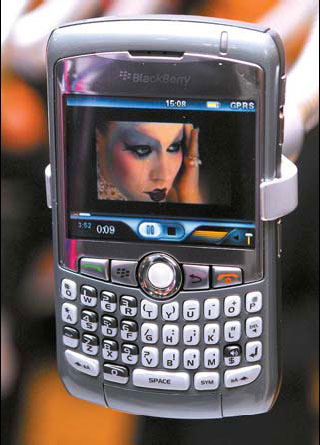

After more than eight years, BlackBerry, the wildly popular handheld communication device that has become a staple for business leaders around the world, is now available in China.
Research in Motion (RIM), the Canadian company that makes the device, confirmed in an exclusive interview recently with China Business Weekly that BlackBerry was made available in China in March to select corporate customers. The company would not say when it plans to roll out the product for the public.
"China's great opportunity and we're very excited about being in China. We want to be here in the long-term and we feel that as China continues to grow and ascend on the world stage - economically, politically, business-wise - it's a great opportunity for us to be here," says Norm Lo, RIM's vice-president Asia-Pacific.

"We're excited about the fact that we're ramping up business in China. You'll start to hear more about it as we gear up the sales and marketing activities."
BlackBerry's arrival in China, the company's last major global frontier, has been a long time coming. The Waterloo, Ontario-based company fi rst applied to register BlackBerry in the country in 1999. In 2002 it announced plans to enter the Chinese market and, two years later, signed a letter of intent with China Mobile, the country's largest cellphone carrier.
But regulatory hurdles delayed BlackBerry's China debut. Last June, after 8 years, RIM was granted approval from the Ministry of Information Industry to sell BlackBerry in China.
At the time, RIM said it expected to begin selling the device sometime in 2007. A Beijing-based RIM manager said 5,000 advance orders had already been received, according to media reports at the time.
Lo says that the BlackBerry 8700 Series was certifi ed by RIM's partners in China last fall and was rolled out in March. Initially, RIM plans to target corporate consumers, especially multinational companies that are already familiar with the product and its benefi ts. It's a strategy the company has adopted in other markets too, Lo says.
The company will then target small- and mediumsized enterprises before tackling China's vast consumer market.
"We're working very closely with China Mobile and our partners to make it a coordinated go-to-market strategy," says Lo, who has worked with RIM for over eight years and had held his current post based in Hong Kong for the last three.
RIM, a global leader in the mobile communications market, was founded in 1984 and now operates in about 130 countries, with offi ces in North America, Europe and Asia Pacific. At the end of the fourth quarter of fi scal 2008, the total BlackBerry subscriber account base was more than 14 million.
RIM's net income for fi scal 2008 was $1.29 billion, up 105 percent from the previous year.
RIM has high hopes for the lucrative Chinese market, the world's biggest for mobile phones with an estimated 500 million users. Analysts have estimated RIM could see a 25 percent growth in worldwide customers once it gets fully active in China.
"We're bullish about the prospects of BlackBerry in China," Lo says at an interview in Beijing. "We really feel there's a need and a desire for organizations in China to use a productivity tool and a solution like BlackBerry. It makes China-based enterprises that much more effective."
"We want to roll out BlackBerry in a coordinated, phased manner," he says of BlackBerry's wishes to sell to the Chinese general public. "It's a matter of making sure we do the due diligence ... You can rush into a market, but if you don't have all the plans and partnerships in place, then that's not necessarily the best way forward. We're really looking as a long-term strategic plan. We want to do it right."
One of RIM's hurdles in China will be facing low-cost competition. In 2006, China Unicom, the country's second biggest mobile operator, launched the unapologeticallynamed RedBerry service, in an attempt to capitalize on RIM's success. Even RIM's partner, China Mobile, has its own push-mail device, also a cheaper alternative to the BlackBerry.
But Lo shrugs off the competition, noting that both China Unicom and China Mobile are targeting a different market with their devices than RIM will with BlackBerry.
"The competing devices are different animals. It's really an A to B comparison. They aren't the same thing," he says. "BlackBerry is the defacto standard for global enterprises. It's a trusted, reliable solution."
Lo says RIM is taking a "phased approach" into China, mimicking an approach it has taken in other markets. But he says it's a matter of time before BlackBerry is as synonymous with business in China and it is in the West.
"It comes down to not if, but when," Lo says. "As we continue to develop the market and raise awareness in the country, we do intend to expand our market reach to offer BlackBerry to broader segments, including consumers."
(China Daily 04/28/2008 page7)













